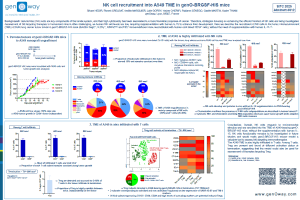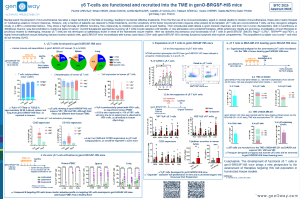Functional γδ T-cells in genO-BRGSF-HIS mice
genO-BRGSF-HIS for γδ T-cell therapies
Background
Development of immunotherapies has been a major landmark in the field of oncology, leading to numerous effective treatments. From the first use of an immunomodulatory agent in clinical studies to modern immunotherapies, these were mainly focused on modulating adaptive immune response. However, only a fraction of patients can respond to these treatments, and the complexity of the tumor microenvironment requires other players to be targeted. γδT cells are unconventional T cells, as they recognize antigens mostly in a MHC-unrestricted fashion. They show a high diversity of effector functions, from cytotoxicity to mediator production and wound healing. Their preactivated state allows a quick immune response, and their role in tumor development, both in beneficious or deleterious manner, was demonstrated in numerous types of cancer. Current therapeutic approaches involving γδT cells include adoptive cell transfer, in vivo stimulation and combined therapies. While preliminary results are promising, investigation of such therapies in preclinical models is challenging, because γδT cells are not developed at satisfactory levels in most of the humanized mouse models. Here we describe the presence and functionality of γδT cells in genO-BRGSF(BALB/c Rag2-/-,IL2Rγ-/-, SIRPαNOD and Flt3-/-), a highly immunodeficient mouse featuring reduced murine myeloid cells. genO-BRGSF mice reconstituted with human cord blood CD34+ cells (genO-BRGSF-HIS) develop functional lymphoid and myeloid compartments. This engraftment is stable over a year(1) and mice do not develop GvHD.

Scientific excellence
From model design to experimental results
Featured in 600+ scientific articles

Collaborative approach
Collaboration with 17 Top Pharmas,
170+ Biotechs and 380+ Academic Institutions

Robust validation data on catalog models
Generated with biopharma partners and in-house

Innovative technologies
and guaranteed freedom to operate

Easy access to models
Models with certified health status from professional breeders in US and Europe




.webp)














